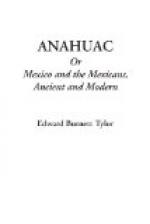It seems hard to be always attacking the Roman Catholic clergy, but of one thing we cannot remain in doubt,—that their influence has had more to do than anything else with the doleful ignorance which reigns supreme in Mexico. For centuries they had the education of the country in their hands, and even at this day they retain the greater share of it. The training which the priests themselves receive will therefore give one some idea of what they teach their scholars. Unluckily, their course of instruction was stereotyped ages ago, when learned men devoted themselves to writing huge books on divinity, casuistry, logic, and metaphysics; concealing their ignorance of facts under an affectation of wisdom and clouds of long words; demonstrating how many millions of angels could dance on a needle’s point; writing treatises “de omni re scibili,” and on a good many things unknowable also; and teaching their admiring scholars the art of building up sham arguments on any subject, whether they know anything about it or not. This is a very vicious system of training for a man’s mind, the more especially when it is supposed to set him up with a stock of superior knowledge; and this is what the Roman Catholic clergy have been learning, generation after generation, in Mexico and elsewhere. Of course, there are plenty of exceptions, particularly among the higher clergy; but, so far as I have been able to ascertain, education in clerical schools has generally been of this kind. It is instinctive to talk a little, as one occasionally finds an opportunity of doing, to some youth just out of these colleges. I recollect speaking to a young man who had just left the Seminario of Mexico, where he had been through a long course of theology and philosophy. He was astonished to hear that bull-fighting and colearing were not universally practised in Europe; and, when his father began to question me about the Crimean war, the young gentleman’s remarks showed that he had not the faintest idea where England and France were, nor how far they were from one another.
I happened, not long ago, to visit a celebrated monastic college in South Italy, where they educated, not ordinary mortals, but only young men of noble birth; and here I took particular care in inspecting the library, judging that, though the scholars need not learn all that was there, yet that no department of knowledge would be taught there that was not represented on the library-shelves. What I saw fully confirmed all that I had previously seen and heard about the monastic learning of the present day. There were to be seen many fine manuscripts, and black-letter books, and curious old editions of great value, good store of classics (mostly Latin, however), works of the Fathers by the hundred-weight, and quartos and folios of canon-law, theology, metaphysics, and such like, by the ton. But it seemed that, in the estimation of the librarians, the world had stood still since the time of Duns Scotus; for, of what we call




